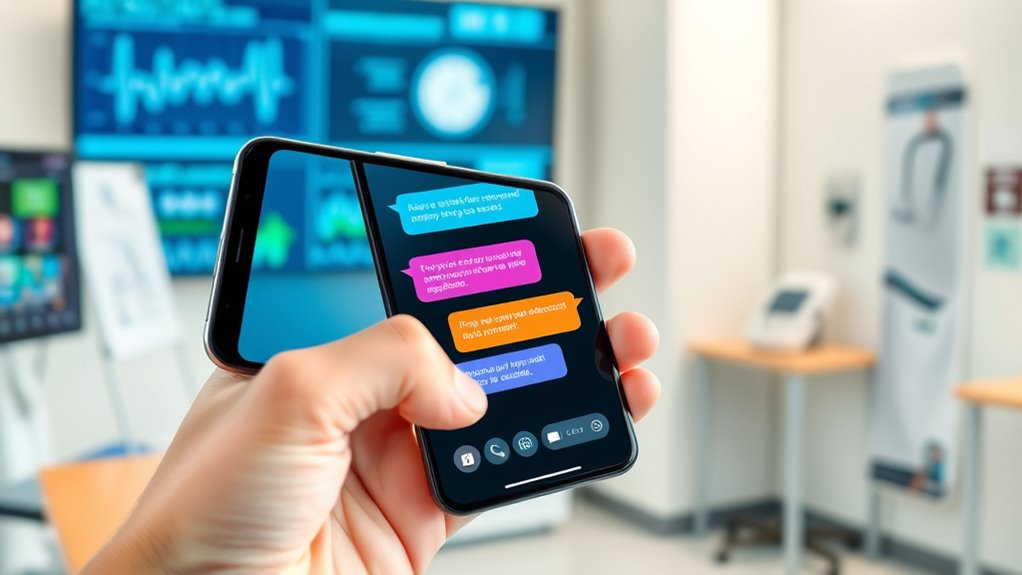AI chatbots in symptom assessment analyze your input in real time using advanced algorithms that compare your symptoms to vast medical data. They identify key details like pain location, severity, and duration, helping to suggest potential causes quickly. While they can support you anytime and reduce the burden on healthcare providers, they aren’t perfect and can miss nuances. Keep exploring to discover how future developments aim to make these tools even smarter and safer.
Key Takeaways
- AI chatbots analyze symptoms in real-time to suggest potential causes and next steps.
- They provide 24/7 support, reducing healthcare workload and improving access.
- Advanced algorithms compare symptoms to vast medical data for accurate diagnoses.
- They integrate natural language processing with medical databases for swift assessment.
- Challenges include understanding complex symptoms, data quality, and ensuring patient privacy.
How AI Chatbots Diagnose Symptoms

How do AI chatbots diagnose symptoms so quickly and accurately? They analyze your input using advanced algorithms that compare your symptoms against vast medical data. When you describe how you’re feeling, the chatbot processes your words in real time, identifying key details like pain locations, severity, and duration. It then matches this information with patterns from millions of similar cases. Unlike humans, AI chatbots don’t get tired or distracted, allowing for rapid analysis. They also incorporate machine learning to improve over time, becoming better at recognizing complex symptom combinations. This combination of natural language processing and extensive medical databases enables chatbots to generate possible diagnoses swiftly and with notable precision. The result is a tool that helps streamline the initial assessment process. Additionally, integrating holistic health approaches can further enhance the accuracy of symptom evaluation by considering physical, mental, and emotional health factors.
Benefits of Using Symptom Assessment Bots

Using symptom assessment bots offers several key benefits that can enhance your healthcare experience. They provide quick, around-the-clock support, so you don’t have to wait for appointments or worry during off-hours. These bots analyze your symptoms efficiently, helping you understand potential causes and guiding you on next steps. They also reduce the burden on healthcare providers, freeing up resources for urgent cases. To visualize, consider this table:
| Speed | Accessibility | Clarity |
|---|---|---|
| Instant insights | 24/7 availability | Clear guidance |
| Immediate response | Anytime, anywhere | Easy to understand |
| Saves time | No appointment needed | Reduces confusion |
| Fast triage | Accessible from home | Empowers you to act |
Additionally, integrating color accuracy in symptom assessment can improve the precision of visual symptom descriptions, leading to more accurate diagnoses.
Limitations and Challenges of AI in Healthcare

While AI chatbots and tools offer many advantages, they also face significant limitations and challenges in healthcare. First, AI models can struggle with understanding complex or nuanced symptoms, leading to misinterpretations. Second, they depend heavily on the quality and accuracy of the data they’re trained on, which can vary. Third, AI tools lack the empathy and contextual awareness that human clinicians provide, potentially impacting patient trust. Fourth, biases present in training data may result in unequal or inaccurate assessments. Additionally, the subconscious power during sleep plays a role in how individuals process and respond to health information, highlighting the importance of human intuition and emotional understanding in healthcare. These issues highlight that AI isn’t a perfect substitute for human judgment but an aid that requires careful oversight. Overcoming these challenges involves continuous refinement, ethical considerations, and integrating AI with clinical expertise to ensure safe, effective patient care.
Ensuring Privacy and Data Security

As AI chatbots handle sensitive health information, ensuring privacy and data security becomes vital. You must implement strong encryption methods to protect data both in transit and at rest, preventing unauthorized access. Regular security audits help identify vulnerabilities and strengthen defenses. Clear privacy policies inform users about how their data is collected, stored, and used, building trust. Limiting data collection to only what’s necessary reduces risk exposure. Access controls ensure only authorized personnel can view sensitive information. Additionally, complying with regulations like HIPAA or GDPR is essential to avoid legal issues. Educating users on privacy practices encourages responsible data sharing. Incorporating vetted privacy measures is essential to uphold ethical standards and maintain user confidence in AI-driven healthcare.
Future Developments in AI Symptom Evaluation

Future developments in AI symptom evaluation promise to make assessments more accurate and personalized through advancements in machine learning and data integration. As technology evolves, you can expect that AI systems will better understand individual health patterns. Here’s what’s on the horizon:
AI symptom evaluation will become more accurate and personalized with advanced data integration and machine learning.
- Enhanced Data Integration: Combining medical records, wearable device data, and patient histories for a holistic view.
- Real-Time Analysis: Providing instant feedback based on ongoing health data, enabling quicker responses.
- Context-Aware Assessments: Considering environmental and lifestyle factors to improve diagnosis accuracy.
- Personalized Recommendations: Tailoring advice and treatment options to your unique health profile.
- Improved Safety Measures: Ongoing research into AI vulnerabilities and bias mitigation will help ensure that AI symptom assessment tools are trustworthy and secure.
These innovations will make symptom evaluation more precise, empowering you to take proactive steps toward your health.
Frequently Asked Questions
How Accurate Are AI Chatbots Compared to Human Doctors?
You’re wondering how accurate AI chatbots are compared to human doctors. While chatbots can quickly analyze symptoms and provide helpful guidance, they often lack the nuanced understanding and judgment of a trained doctor. AI can assist with initial assessments, but it’s not a full substitute. You should still consult a healthcare professional for a thorough evaluation, as humans excel in complex cases and personalized care.
Can AI Chatbots Replace Traditional Medical Consultations Entirely?
You wonder if AI chatbots could fully replace traditional medical consultations. While they can handle basic questions and provide preliminary advice, they lack the nuanced understanding and empathy of human doctors. You shouldn’t rely solely on chatbots for serious or complex issues. Instead, think of them as helpful tools that support your healthcare journey, but always seek professional medical advice when needed.
What Languages Are Supported by AI Symptom Assessment Tools?
Ever wonder which languages these tools support? You’ll find that most AI symptom assessment tools support major languages like English, Spanish, Chinese, French, and German. Many are expanding to include more regional dialects and less common languages. This helps guarantee broader accessibility for users worldwide. Are these language options enough to meet everyone’s needs? While support varies, ongoing improvements aim to make these tools more inclusive and effective for diverse users.
How Do AI Chatbots Handle Complex or Rare Conditions?
When faced with complex or rare conditions, AI chatbots analyze detailed symptom inputs and access extensive medical databases. They often flag cases needing specialized attention and suggest consulting healthcare professionals. The chatbots use advanced algorithms to identify patterns and rare symptoms, but they aren’t substitutes for expert diagnosis. You should always seek professional medical advice for rare or complicated health issues, as AI tools serve as helpful preliminary assessments.
Are There Costs Associated With Using AI Symptom Assessment Services?
Like steering through a maze without a map, using symptom assessment services can come with costs. Some platforms charge fees for detailed evaluations or advanced features, while others offer free basic assessments. You might also face subscription plans or pay-per-use options. Always check the service’s pricing details beforehand, so you’re aware of any expenses, much like planning your route before entering unfamiliar territory.
Conclusion
Think of AI chatbots as trusted guides on your health journey. While they can light the way and offer quick insights, they’re just one part of the map, not the entire destination. You must navigate carefully, always trusting your instincts and consulting healthcare professionals. Like a lantern in the dark, they illuminate possibilities, but you’re the traveler responsible for the final steps. Use AI wisely, and let it help you find your way to better health.









